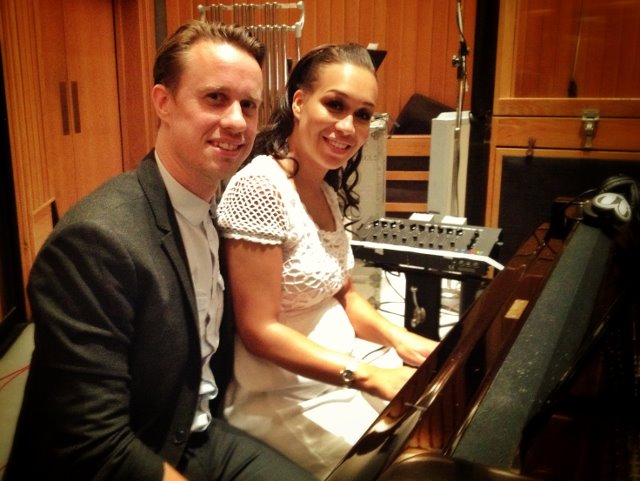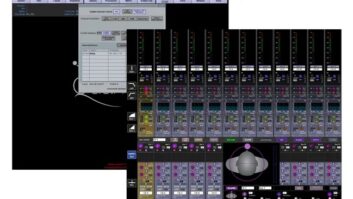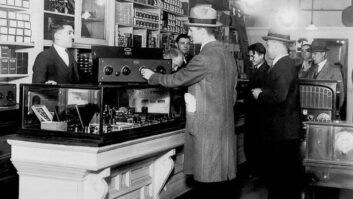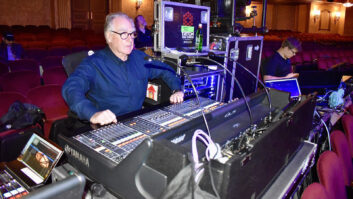
UK singer Rebecca Ferguson is the first artist in the world to record an album using the new PMC QB1-A reference loudspeakers, and then also have the album mixed and mastered on PMC.
Ferguson, who rose to fame in the 2010 series of The X Factor, recording her third album Lady Sings The Blues at Capitol Studios in Los Angeles. The facility had recently upgraded its world-famous Studios A and B to incorporate PMC’s QB1-A reference monitors, a high end system that is specifically designed to give medium-to-large-scale recording facilities all the accuracy, dynamics, resolution and headroom they need from their main monitoring.
Lady Sings The Blues, a collection of Billy Holiday covers, was recorded with an orchestra in Studio B. Ferguson says she was initially sceptical about the project because she prefers to record original material, but after falling in love with the Billie Holiday story she decided to tackle the project.
Musician and producer Troy Miller, who has worked with a host of artists including Laura Mvula, Amy Winehouse, Adele, Omar and John Newman, chose to record at Capitol Studios because it is one of the few remaining studios that was around in the 1950s when Billie Holiday was recording. Billie herself recorded there, along with a host of others including Frank Sinatra, Ella Fitzgerald and Nat King Cole.
“The studio has changed a lot since then, having been done up by Les Paul, but it still retains its charm and history.” Miller says. “It also still uses some of the original gear and microphones. The U47 we used had Frank’s (Sinatra) name written on it!”
Studio B’s control room now has a Neve 88R console, as well as the recently acquired PMC QB1-A monitors.
“Capitol has had lots of gear thrown at it over the years, but Steve Genewick, who engineered the session for me, didn’t hide the fact that they had rejected all other offers of monitoring and assured me that the PMC QB1-A’s were ‘THE ONE!!’,” Miller adds. “Al Schmitt, who is also one of the chief engineers, walked on to my session like he owned the room (he practically does), at which point I turned the PMC’s up 20db (we had been working fairly quietly up until that point). What struck me was that the PMC QB1-As sounded exactly the same when I cranked them up – still the same level of detail and depth. Sometimes I feel you lose that detail when you pump it up on other speakers. I often had the overwhelming feeling that the speakers were not there and I was listening to the ‘feeling’ I got from them. That’s a great sign I think!”
Once the recording was completed, Miller brought the project back to London where Peter Beckmann, owner and founder of TechnologyWorks Mastering, was booked to master the album. However, on listening to the tracks, Miller felt the mix needed more attention and Beckmann was quickly co-opted in to deliver the feel he was looking for.
“I spend most of my time mastering these days, but I still mix a few projects a year and I was delighted to get involved because it was such a great project,” Beckmann says. “The sound was fantastic, as you would expect from something recorded at Capital Studios, but having done all the arrangements, Troy knew exactly what he was after. So we worked on bringing out all the emotion and drama of the songs, with Rebecca’s voice upfront in the mix.”
Beckmann’s facility is equipped with a pair of PMC IB1S monitors, powered by a Bryston amplifier, and these proved to be ideally suited to the task because their precision allowed Beckman and Miller to hear every detail in the recording.
“I’ve had my PMCs for a few years and they are, quite simply, amazing,” Beckmann says, “They are incredibly revealing and this allows me to hear exactly what is happening so that I can feel confident about any changes I need to make.
With the resurgence in vinyl I’ve been cutting a lot of lacquers and, because almost every cutting room has PMCs and the family sound of PMC translates so well from facility to facility, I can just turn on the lathe and trust what I am hearing.”
Troy Miller adds: “It’s interesting to me that all three stages of recording this album were done using PMC monitors – tracking, mixing and Mastering. It’s not something I had planned, but in hindsight it was very comforting! First and foremost, I knew exactly where we were at, from one stage to another, and I didn’t have to readjust my ears to temper a different EQ or depth of field etc. But more importantly, the feeling I got from them was a sense of representing the room that the music was actually recorded in, which is not an easy ask. Altogether PMC have won me over. I’m looking to put a pair of twotwo.6’s in my own studio in the near future as I am about to start work on Laura Mvula’s next album and I need clarity.”
Rebecca Ferguson’s new album was released on March 9th through Sony Music. She is currently appearing on a number of TV shows to promote the album.
-ends-
About PMC
PMC is a UK-based, world-leading manufacturer of loudspeaker systems, the tools of choice in all ultra-critical professional monitoring applications, and also for the discerning audiophile at home, where they provide a transparent window into the recording artist’s original intentions. PMC products use the best available materials and design principles, including the company’s proprietary Advanced Transmission Line (ATL™) bass-loading technology, cutting-edge amplification and advanced DSP techniques to create loudspeakers that present sound and music exactly as it was when first created, with the highest possible resolution, and without coloration or distortion. For more information on our clients and products, see www.pmc-speakers.com.







